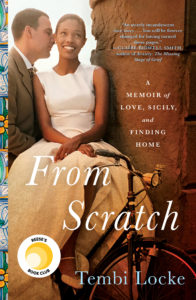In her New York Times bestselling memoir, From Scratch, Tembi Locke invites readers into her heart. Taking them on a journey through the romance of her and her late husband, Saro, her deep experience with grief and her quest for healing in Italy, Locke leads readers to reflect on the brevity and breadth of life. The Conversation Project had the pleasure of connecting with Locke, who shared her insight on a series of questions about end-of-life care conversations. This first part of a two-part series discusses the passing of Saro, his expressing his end-of-life wishes, how Locke’s loss influenced her to have the conversation and includes one of the recipes (inspired by the culinary adventures of her and Saro) featured in her book!
Your book, From Scratch, speaks heavily to love, loss and healing. At The Conversation Project, we deeply believe that having meaningful conversations about end-of-life care wishes is an expression of love as it provides reassurance when we lose someone, and allows us to heal through the knowledge that we honored our loved one’s wishes. What conversations (if any) did you have with your husband about his care? How did you come to understand his end-of-life care wishes? How did these conversations, or lack of conversation impact you both?
Saro and I had many conversations about death. I think we wanted the space to contemplate it openly. Expressing mortality openly was meaningful and, in a surprising way, liberating because it acknowledged the fear/unknown at the center of our experience. But we never talked about the logistics of end-of-life. We both had advanced directives. We both had told each other abstract things about what we might want. But when we approached the end stages, I realized there was so much we had not talked about. That caused me great stress. There are so many logistical and tactical decisions to be made. I had had no experience with medical industrial complex at the end stages until I was in the middle of it. I had to rely on my intuition and an understanding of what would work best for our family. Ultimately, the conversations we did have made it clear that he wanted a holistic approach and that he wanted to be home, surrounded by family. He wanted what I now know to be “whole person care.” He wanted to be seen as a father and husband, not just a patient. And he wanted comfort.
Since your experience with your husband, can you describe any conversations you’ve personally had about your own wishes?
I have jump started many meaningful conversations with my immediate family. I try to ask what others value most and share what I value. It’s not always easy for people to accept an invitation to talk about their own mortality. But I nudge it along. And we have found that holidays, when we are all together in person, are a natural time to talk about the big stuff. I try to normalize the conversation and bring it in the present, but in an easy going way. It’s an ongoing process, not a “one and done.”
You’re not only a writer, as readers learn in your book, you’re also a cook! If you have any favorite recipes or excerpts you’d like us to include, please let us know. Our followers love the idea of a favorite meal or dessert to celebrate a loved one.
Shelling fresh fava beans is a labor of love. Removing the hull and peeling back the outer skin of each bean takes time, patience, and a soulful respect for the cultivation of this generous bean. There is a reason it has been a Mediterranean mainstay for centuries. For me, preparing fava beans is a kind of meditation. I put on some music, pour myself a glass of wine, and ready the beans. It is the way Saro taught me. Click here to read the rest of her recipe for fava beans.
Continue reading part two of this series where Locke expands upon her experience with loss and caring for her late husband. Her story reminds us that having the conversation is a tremendous act of love, as it gives way to understanding, healing and honoring one another. We encourage you to pick up a Conversation Starter Guide , turn to the one you love and have the conversation.
Tembi Locke’s memoir From Scratch can be found here.


